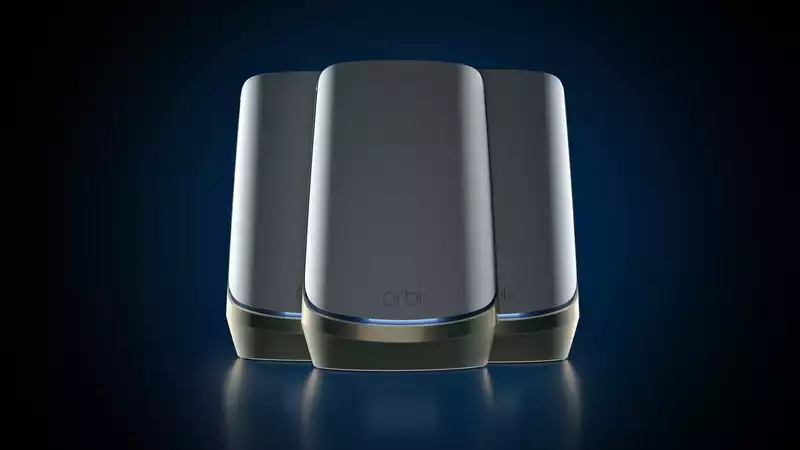We're used to seeing big numbers and impressive claims in the home networking space, but Netgear's new mesh system, the Orbi Quad-Band Mesh WiFi 6E, might make you do a double-take thanks to its $1,499.99 price tag. That's more than double the price of the Orbi Wi-Fi 6 (RBK852), the best mesh networking kit available.
What on earth could justify paying $500 per unit for a three-pack mesh system? Only the most impressive specs and promised performance we have ever seen. Here are some of the highlights.
The latest Orbi is not the first Wi-Fi 6E mesh router to hit the market (though one of the earliest), but it is the first quad-band mesh router we've seen and the first to offer a combination of both in a mesh system
Wi-Fi 6
Wi-Fi 6E, for those of you who have not been diligently following all the technological changes in router technology, is a major step up from the already fast Wi-Fi 6 standard, adding a new 6 GHz transmission band to the already commonly used 2.5 GHz and 5 GHz bands (For details, see "Wi-Fi 6"). (For more information, see "What is Wi-Fi 6E: Routers, Devices, and Advantages over Wi-Fi 6"). ) It is the same standard used by the award-winning Netgear Nighthawk RAXE500, but it is a multi-device mesh system for larger homes.
Unlike a typical slice of the frequency band, the 6 GHz band is virtually unused by consumer products, making it not just an extra lane on a congested road, but a four-lane highway that 6E-equipped devices can keep to themselves. Congestion is nonexistent, especially in congested environments such as apartment complexes and cities.
The designation quad-band is equally important. Whereas most mesh systems use one or two radio bands, the new quad-band Orbi uses three bands for users: 2.4, 5, and 6 GHz, with the fourth, 5 GHz band dedicated to data sharing between routers and AXE1100 evaluation satellite units. This backhaul channel eliminates bottlenecks in moving data between devices, ensuring optimal speeds for your devices anywhere in the home.
Netgear has further enhanced this mesh kit by supporting up to 16 simultaneous Wi-Fi streams with 12 built-in antennas. For homes with many devices that connect and stream, this is the answer to today's increasing bandwidth demands, easily supporting TV streaming, gaming, video chat, and content uploading without slowing down.
The rest of the spec list for the Orbi Quad-Band Mesh WiFi 6E RBKE960 series only highlights the best features the new mesh system has to offer; Orbi can handle up to 10.8 gigabits per second, and a standard pack of three can cover up to 9,000 square ft. coverage. The main unit supports a 10-gigabit WAN, and each unit has 2.5 gigabit ports and multiple gigabit Ethernet connections for connecting PCs, game consoles, and other wired devices at top speed.
Netgear adds Smart Parental Controls and Armor Security and offers easy setup and management via the Orbi app.
The new Orbi is also available in black; the black edition of the Orbi Quad-band WiFi 6E is a limited edition, offered only through Netgear's website, but not more expensive than the standard white model.
The Orbi Quad-band 6e mesh kit sells for $1,499.99 (£1,499/€1,699) for a three-pack (one main router and two satellite units). Both the standard three-pack (model number RBKE963) and the limited edition black version (model number RBKE963B) are available through Netgear.com for $1,499, with the white model expected to hit major retailers later this month. A smaller two-pack (one main router and one satellite unit) will sell for $1,099, and an add-on satellite unit (model RBSE960) will sell for $599 each.
But the real question is, does anyone need this level of performance? For most people, the answer is no. Gigabit speeds are typically the fastest available to most broadband users, and the greatest benefit from Wi-Fi 6E comes from the still small number of Wi-Fi 6E-equipped devices. Therefore, the greatest benefit from Wi-Fi 6E will come from devices equipped with Wi-Fi 6E.
Is it worth paying an extra $1,000 or so for this quad-band behemoth? Not right now, but maybe in a year or two, and with the rapid expansion of data-intensive applications such as 8K streaming, online gaming, and the growing demands of online living, it won't be long before this kind of performance goes from overkill to a necessity.
We will be reviewing the new Orbi quad-band Wi-Fi 6e mesh system in the coming weeks, so stay tuned for a detailed evaluation.
.









Comments